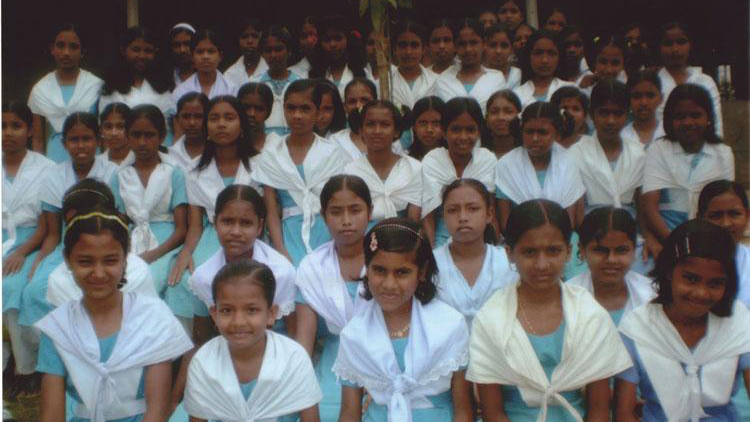UVU professor Abdus Samad began his dream school in 2005 by using his own money to buy the land in Bangladesh where it would be built.

One rainy season 17 years ago, Abdus Samad, Utah Valley University (UVU) professor of economics and finance, stood in a downpour in the Bangladesh farming village where he was born and raised. He watched as a group of schoolgirls struggled through the mud in flip-flops to a bus stop. Without the bus, they would walk three miles from Khajuria, Pak Pohri, and Kaigram to attend Ranbagha High School. With each step, mud flipped up onto their legs and clothing. Soaked to the skin with their wet books in hand, they begged the bus driver to let them onboard. They were turned away. Another bus and another refusal.
“It was really horrible,” Samad said. “I was almost in tears. The bus driver had no respect to take them. The poor and illiterate have no respect. They are ignored in society.”
Samad learned that the young women were not allowed on the bus because they did not have money. “How can they?” Samad said. “Their father is a day laborer and lives hand-to-mouth. They cannot afford to pay the bus fare, as they don’t have jobs every day.”
“My uncle saw these things, and he said, ‘Hey, Abdus, you spend money buying food for the village. Instead of giving money to buy food, why don’t you give something more permanent?’ At that moment, I decided that I would build up a high school in this village,” Samad said.
“Giving education is like giving eyesight to the blind. It is education and education alone that can help remove poverty, hunger, and social stratification. Education can provide self-confidence and dignity to them.”
It is a lesson that Samad knows well. “My parents did not have an education because they did not have a school nearby. My parents were illiterate.”
He lost his mother when he was in grade school. “There is one memory that I can remember. I was in fourth grade, and I was not willing to go to school at the time. My mother said, ‘No, you have to go to school. I have given you good clothing to go to school.’ She died that year.”
Samad honored his mother by getting an education. “When I was a student, I used to walk six miles on foot (both ways) from Khidra Baria to attend Chowgram High School.” His determination paid off when he was awarded a Fulbright Scholarship to attend college in the United States.
Building a school in his village was “one of the best deeds that one can do” said Samad, who is eager to pay his good fortune forward.
The UVU professor of twenty years began his dream school in 2005 by using his own money to buy the land where it would be built. He received a few donations from friends and colleagues at UVU and supplemented that funding by teaching summer courses at the university — he continues to donate his summer money to the Bangladesh school. In 2006, the doors opened with a sixth-grade class of 115 students. The following year, a seventh grade was added, then in subsequent years, grades eight, nine, and ten. Currently, there are 425 students studying in the school, where tuition is always free. 75% of students are female.
“All girls, whoever applies, must be admitted, and then, if there is room, boys. In our society, they don’t pay enough respect to [women]. If I can train them, if I can educate them, they will pass that on. There is a saying [that] the hand that rocks the cradle rules the world. The first teaching that a child gets is from their mother.”
Samad pays the salaries of the faculty and staff at the school to ensure the education received is exceptional. National performance tests show that students from his school pass at a rate of 80-100%.
The establishment of a high school and the policy of free education is transforming attitudes in the village in ways that transcend learning and are broadening opportunities.
“The biggest impact is the change of expectation. Early marriage has stopped for girls. Parents stopped giving marriage to girls [in their early teens] until high school was complete,” Samad said. “Already a good number of students, after completing their high school education, joined college and completed their undergraduate degrees. Some are already doing jobs in local offices. A good number are employed in various jobs in the private sector after graduating from high school.”
An idea that grew out of a muddy rainstorm and a heartbreaking scene has blossomed into a life-transforming gift.
“When I visit annually, thousands of local people come to see me and express their thanks and gratitude for the benefits they are enjoying,” Samad said. “The school is a euphoria of joy. I feel humbled and honored when they say, ‘My son or daughter graduated this year from your school. They are studying in a college. They are doing a job.’ At that moment, I express my thanks to God and say, ‘Oh God, it is your mercy. I am not able to change the world, but I have at least changed these few people.’”
Samad hopes to build a college in the area, creating greater opportunities for students to continue their educations. He is currently working to create partnerships that will allow that dream to come to fruition.